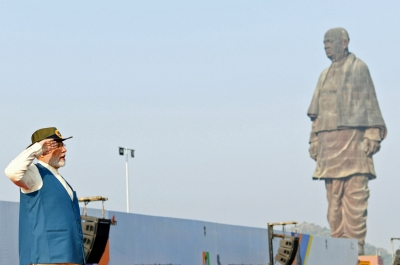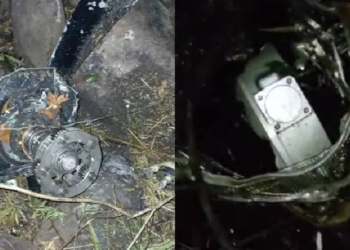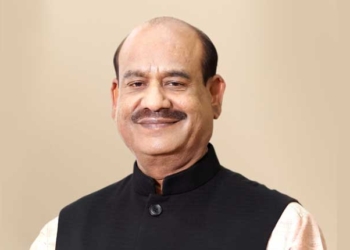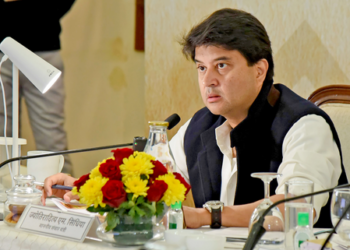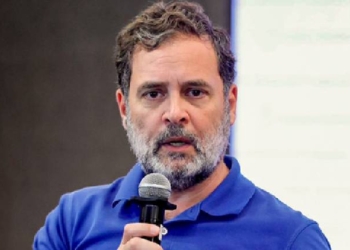As India marks Ekta Diwas (National Unity Day) in 2025, it is timely to revisit the life and legacy of Sardar Vallabhbhai Patel, the Iron Man whose statesmanship and resolve welded a vast and fragile subcontinent into a single republic.
Seven decades on, Patel’s lessons about unity, institutional discipline and civic responsibility remain indispensable for a nation that thrives on its diversity.
The Architect of Unity
When Sardar Patel took office as India’s first Deputy Prime Minister and Home Minister in August 1947, the map of the subcontinent was a jigsaw of more than 560 princely states — some eager to join the Union, others uncertain or hostile.
Through a mixture of tact, negotiation and firmness he managed to integrate the great majority into India, converting a precarious political geography into a sovereign whole. As former prime minister Morarji Desai noted, “the integration of the states could be termed as the crowning achievement of Vallabhbhai Patel’s life.”
Patel insisted that political union without moral cohesion was hollow. “Manpower without unity is not a strength unless it is harmonized and united properly; then it becomes a spiritual power,” he said.
Equally plain was his civic warning: “It is the prime responsibility of every citizen to feel that his country is free and to defend its freedom is his duty.”
These were not rhetorical flourishes but a program for nation-building: unity anchored in citizenship and duty.
Unifiers Across Regions
The task of nation-making is not peculiar to the subcontinent. Across the Gulf, leaders such as King Abdulaziz Al Saud and Sheikh Zayed bin Sultan Al Nahyan similarly transformed fragmented polities into unified states; today they are remembered as founding heroes by Saudis and Emiratis alike.
Their example — of combining political consolidation with appeals to shared identity and purpose — offers a useful comparison: the work of unity is at once practical and symbolic, military and moral.
In India, Patel faced delicate missions — Hyderabad, Junagadh and other accession questions — that required precisely that balance of persuasion and authority.
Leaders who can see beyond narrow interests and bind diverse polities under a common civic roof leave durable legacy.
Diversity as Strength; Institutions as Foundation
Patel’s vision of India was not uniformity in disguise, but pluralism in practice. He believed India’s variety of languages, faiths and customs should flourish inside the framework of a single constitutional order.
For that, he built institutions — above all the All India Services, the so-called “steel frame” that would guarantee impartial administration across regions.
His directions to the civil service were blunt and timeless: “A civil servant cannot afford to, and must not, take part in politics. Nor must he involve himself in communal disputes. To stray from the path of rectitude in either respect is to debase public service and diminish its dignity.” That ethical compass remains central to a functioning plural democracy.
Modern India’s police, paramilitary formations and civil bureaucracy bear traces of this blueprint. Patel’s argument was simple: effective institutions turn fragile unity into stable nationhood.
Renewing Patel’s Vision in Contemporary India
Under successive governments, and notably under the leadership of Prime Minister Narendra Modi, Patel’s memory has been institutionalised and popularised.
The Statue of Unity, the observance of National Unity Day (October 31), cultural showcases such as the Ekta Parade, and the programme ‘Ek Bharat — Shreshtha Bharat’ are contemporary efforts to translate a historical legacy into civic practice.
These are not merely monuments and ceremonies: they are an attempt to reconnect a young generation with the values of administrative integrity, public service and national belonging that Patel championed.
Endorsements from Muslim Thinkers and Leaders
Crucial to Patel’s moral stature is the cross-communal recognition he won in his own lifetime — including from leading Muslim thinkers and politicians who appreciated his dedication to national unity.
Maulana Abul Kalam Azad, the venerable scholar and India’s first education minister, addressed Patel repeatedly in India Wins Freedom and the larger record of the time shows Azad taking Patel seriously as a central actor in the transfer of power and the early consolidation of the Union.
Rafi Ahmed Kidwai, an influential Muslim parliamentarian, worked alongside Patel in the tumultuous early months of independence; the published correspondence and archival volumes record their interactions and Kidwai’s recognition of Patel’s administrative role during crises. Such archival records demonstrate that Patel’s firmness and administrative competence were acknowledged across the political and communal spectrum.
These endorsements are not token gestures: they underscore a vital truth about Patel’s nationalism — it was constitutional rather than communal, oriented to rights and duties rather than sectarian gain.
Patel’s conception of nationhood was one every Indian could inhabit, regardless of religion.
Why This Matters in 2025
India in 2025 faces complex challenges: rapid urbanisation, social flux, regional aspirations and ideological polarization. Patel’s example speaks directly to these pressures. He taught that unity is built patiently — through institutions, sober administration and the insistence that every citizen share the burden and benefit of freedom.
As he warned, “Faith is of no avail in the absence of strength. Faith and strength, both are essential to accomplish any great work.”
That maxim remains a practical programme for a country that must bind its many selves into one civic project.
Sardar Vallabhbhai Patel was not merely a consolidator of territory; he was the moral architect of India’s unity.
Like other nation-builders — whether in Arabia or elsewhere — his name is venerated not because he sought uniformity, but because he secured the space in which diversity could live together in dignity.
As we celebrate the Ekta Diwas 2025, let us recall that Patel’s legacy belongs to every Indian, irrespective of faith. He asked us to build institutions, to practice public virtue, and to hold our country together with strength and compassion.
In that spirit, India’s unity is not an achievement of the past alone but a responsibility for the present and future.
((Zahack Tanvir is an Indian-origin geo-political analyst and founder of UK-based The Milli Chronicle. With expertise in geopolitics and counter-extremism, he provides insights into global affairs. He holds certifications in Counterterrorism from the University of Leiden of the Netherlands, and Georgetown University of Washington DC. He tweets under @ZahackTanvir))
(IANS)




